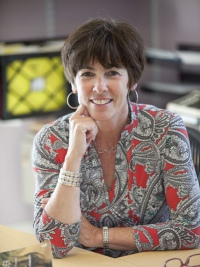About

The WW Dissertation Fellowship in Women’s Studies
Jennifer Scanlon
WS ’87
Money and the Single Girl: Jennifer Scanlon WS ’87 on Helen Gurley Brown’s Economic Legacy
When Helen Gurley Brown—author of Sex and the Single Girl, famed Cosmopolitan editor—died in August 2012, famous quotes and epigrams by the controversial creator of “the Cosmo girl” flooded the Internet. “Good girls go to heaven, bad girls go everywhere.” “If you’re not a sex object, you’re in trouble.” “Never fail to know that if you are doing all the talking, you are boring somebody.”
Jennifer Scanlon WS ’87, author of the widely acclaimed biography Bad Girls Go Everywhere: The Life of Helen Gurley Brown (Oxford University Press, 2009), has a different favorite Brown teaching. “Strangely absent from the single-girl mantras is one of her most significant statements: ‘Being smart about money,’ she wrote in 1962, ‘is sexy,’” Dr. Scanlon noted in a Washington Post commentary on Brown’s passing. “A child of the Great Depression, Brown learned early in life that money matters, and she never relinquished her Depression-era sensibility about finances.”
It’s this legacy that may be Brown’s most relevant contribution to single women fifty years later, with the economy in a downturn. “The current economy poses so many obstacles for young women: significant college loans they can only hope to be able to pay off; an increasingly technical economy that is only partially welcoming to women; never-ending media deliberations about what women really want,” says Dr. Scanlon. “Meanwhile, the need for women to pursue financial autonomy is as great as ever, so the questions about what women want—work, family, and so on—ought never to be divorced from considerations of the current and future economic prospects of women and men. Sadly, they often are.”
Where does that leave the Cosmo girl today? “Popular culture depictions seem to present women as alternately driven to succeed in a world in which their sex is still a marker against them or consumed far more with sex and personal (relationship) issues than with their future,” says Dr. Scanlon. “Both of those play well in the media, but of course the reality isn’t one path or the other.”
Take, for example, the incarnations of the single girl that have appeared in popular culture, one of Scanlon’s areas of scholarly interest. “In Mary Tyler Moore, as progressive as Mary was as a single woman who was determined to ‘make it after all,’ she was still reliant on her boyfriend and her boss, two men whose authority and realism far surpassed Mary’s quirky optimism and naïveté,” Dr. Scanlon points out. “The women in Sex and the City and now the ‘girls’ in Girls both have embraced sexual desire and professional desire, but on both of these television shows men are in the wings—partly, at least, to provide financial support of one kind or another.”
“This is a very challenging time for young women trying to find their way as workers and as women,” Dr. Scanlon says of the economic realities young woman of today face. “We are now in a situation, for the first time in U.S. history, in which a significant number of people still owe on their student loans when they apply for Social Security. In that sense, young women must be careful and prudent.”
Scanlon muses on young women’s response to the current television hit, Girls: “I think young women may like Girls because in the back of their minds, viewers applaud Hannah’s attempts at independence, but also feel a little bit of comfort, thinking that her parents will rescue her if things really don’t work out. The struggle is still there: will she make it on her own, will her parents again help her out, or will she end up in a relationship that supports her nontraditional work life?”
As William R. Kenan Jr. Professor of the Humanities in Gender and Women’s Studies at Bowdoin College, Dr. Scanlon is currently working on two projects. One is an article attempting to reconcile the current financial crisis with the massive consumerism found in “chick lit.” “My main interest in the genre is how it has described women’s relationships to consumerism, to shopping, which I’ve argued often takes the place of romance in this genre,” she explains “Shopping, in effect, trumps men on women’s list of desires. But in today’s world, how does that work? How can these novels celebrate excessive consumerism when so many readers may be losing jobs? Is there chick lit without shopping?” Dr. Scanlon’s second project is a biography of Anna Arnold Hedgeman, placing her in the context of civil rights history, “She was a civil rights luminary,” says Dr. Scanlon, “but her fit was not always comfortable, and her story has yet to be told.”
Photo: Copyright Dennis Griggs/Tannery Hill Studios

